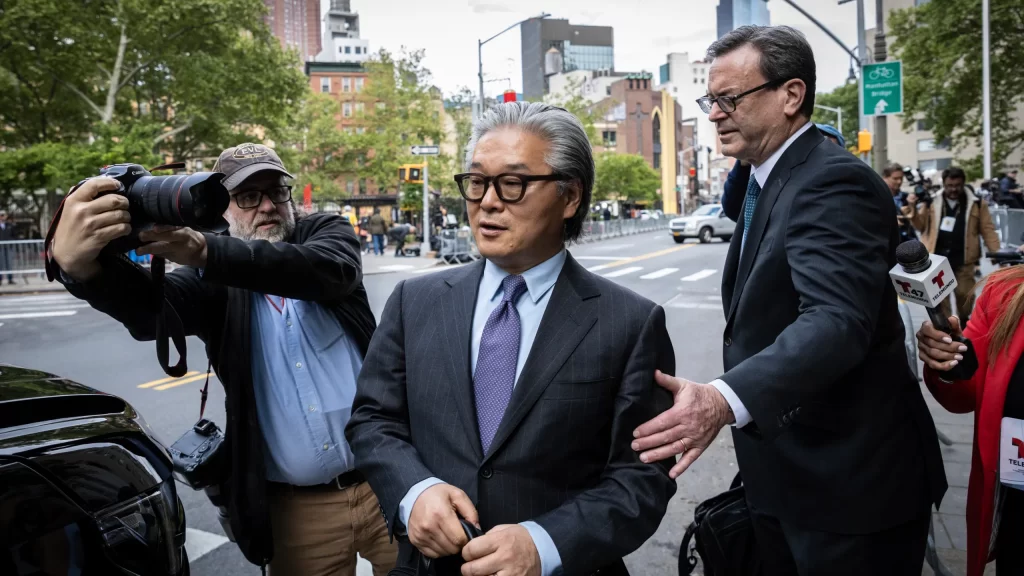Sung Kook “Bill” Hwang, the former head of Archegos Capital Management, has been sentenced to 18 years in prison for his role in a massive fraud that caused billions of dollars in losses to major banks. The sentence follows Hwang’s conviction on charges of fraud and market manipulation related to the collapse of Archegos in 2021.
U.S. District Judge Alvin Hellerstein, who presided over the case, stated that the financial damage caused by Hwang’s actions was unprecedented. “The amount of losses that were caused by your conduct are larger than any other losses I have dealt with,” Judge Hellerstein remarked before delivering the sentence, according to Reuters. Though prosecutors had sought a 21-year prison term for Hwang, the 18-year sentence handed down is still exceptionally lengthy for a white-collar crime of this nature. The judge also indicated that a decision on a restitution payment would be made at a later date, with the sentencing hearing set to resume on Thursday.
Hwang, who once oversaw a hedge fund valued at $30 billion, was convicted of lying to major investment banks while secretly amassing massive, undisclosed bets on several companies. When Archegos was unable to meet its obligations, the fund’s collapse triggered a dramatic sell-off of stocks, causing the firm to implode in less than a week. The event became one of the largest hedge fund failures since the 2008 financial crisis, and it sent shockwaves through the global financial system.
The collapse had far-reaching consequences for several prominent financial institutions, with banks such as Credit Suisse, Japan’s Nomura, and Morgan Stanley each suffering massive losses. Archegos’ failure exposed weaknesses in the financial industry’s risk management and oversight, as Hwang’s firm was able to accumulate such large positions without raising alarms.
Hwang’s defense team had called for leniency, citing his Christian faith and charitable contributions as mitigating factors. They also pointed to his drastic financial downfall, which saw his wealth plummet from an estimated $30 billion at its peak to around $55 million. Despite these arguments, Judge Hellerstein rejected the plea for a lighter sentence, labeling it “utterly ridiculous” in light of the magnitude of the financial damage caused by Hwang’s fraudulent activities. The judge also made a comparison between Hwang and Sam Bankman-Fried, the disgraced founder of cryptocurrency exchange FTX, who was sentenced to 25 years in prison for fraud last year.
Hwang’s lawyers have not yet responded to media requests for comment. The sentence is a significant development in a case that has drawn widespread attention, not only for the scale of the financial losses but also for the apparent lack of oversight and the culture of risk-taking that enabled such a massive fraud to unfold.
Hwang’s sentencing marks a key moment in the ongoing scrutiny of financial practices and the accountability of top executives. The case has sparked further debate on how the financial industry regulates risk and ensures transparency in investment management. While the 18-year prison term represents a major consequence for Hwang, it also underscores the broader issue of corporate malfeasance and the need for stricter enforcement of financial regulations.
In addition to Hwang’s sentence, his deputy at Archegos, Patrick Halligan, who was also found guilty of three criminal charges related to the case, is set to face sentencing in January 2024. This follows a trial in which Halligan, along with Hwang, was accused of being complicit in the fraudulent activities that led to Archegos’ downfall.
Hwang’s conviction and sentencing serve as a stark reminder of the potential risks in the financial industry, where unchecked speculative trading can lead to catastrophic consequences not only for investors but for the wider economy. As the case continues to unfold, it is likely that the fallout from Archegos’ collapse will continue to have long-term implications for regulatory practices and the future of financial oversight.








